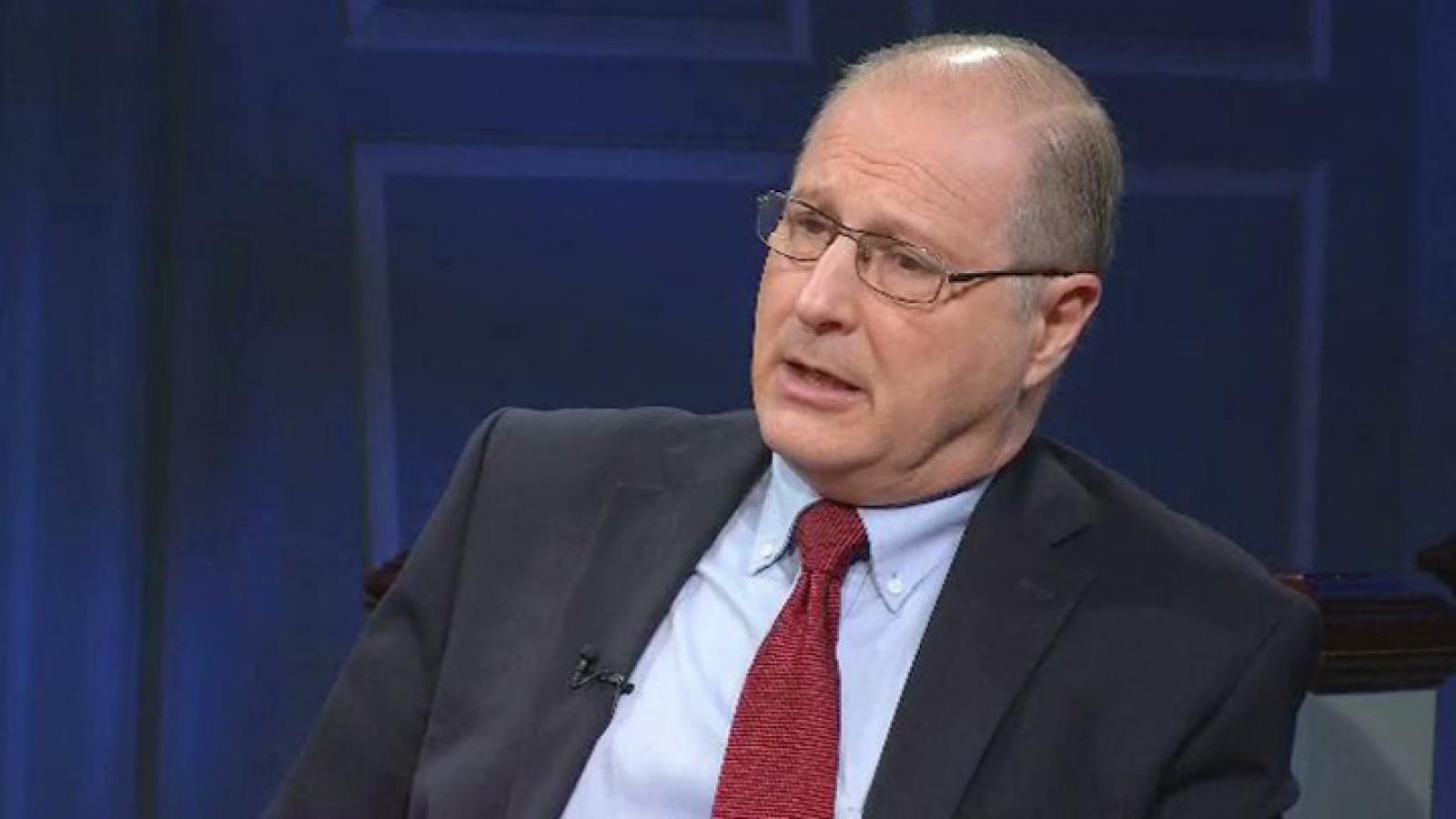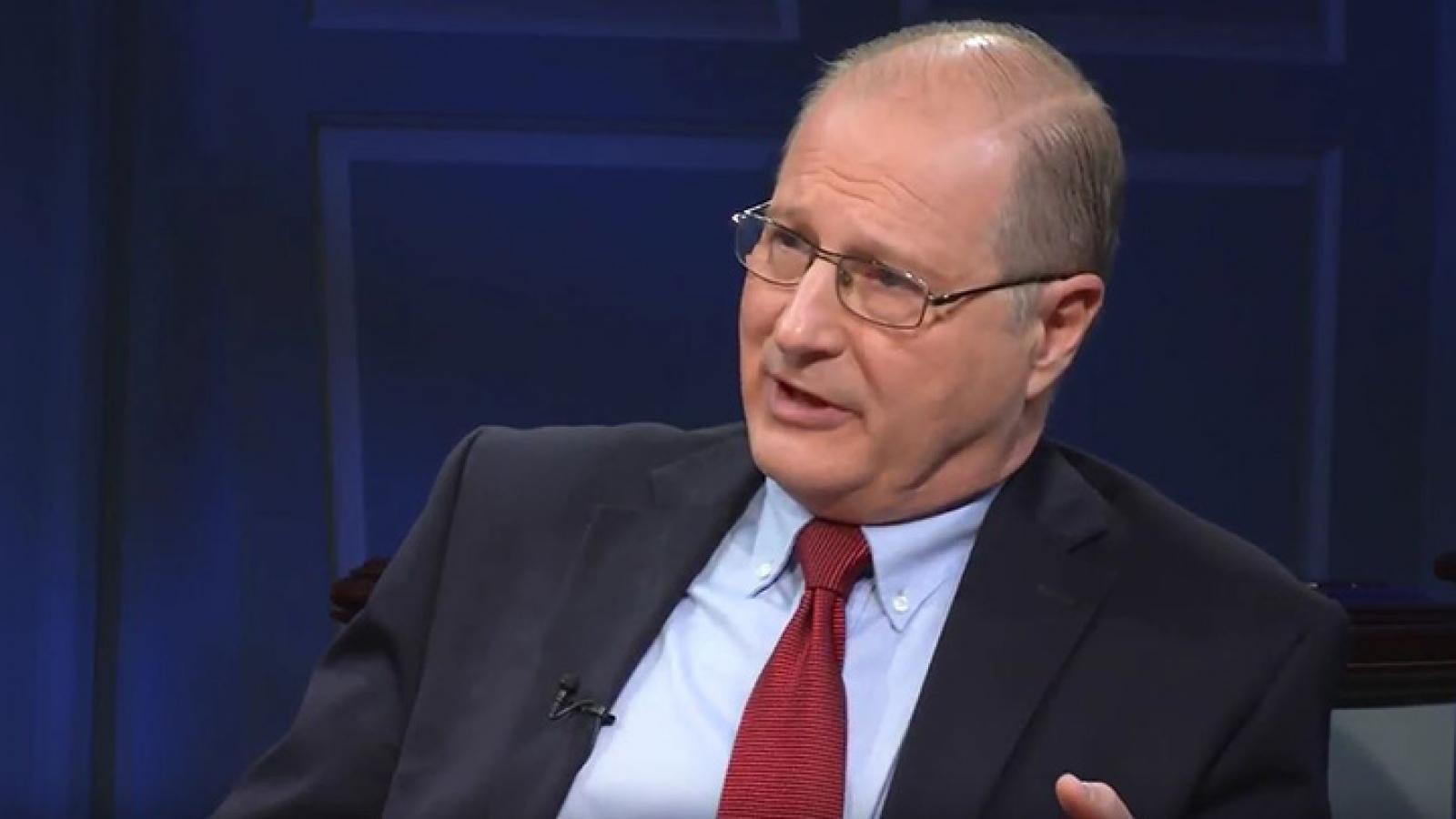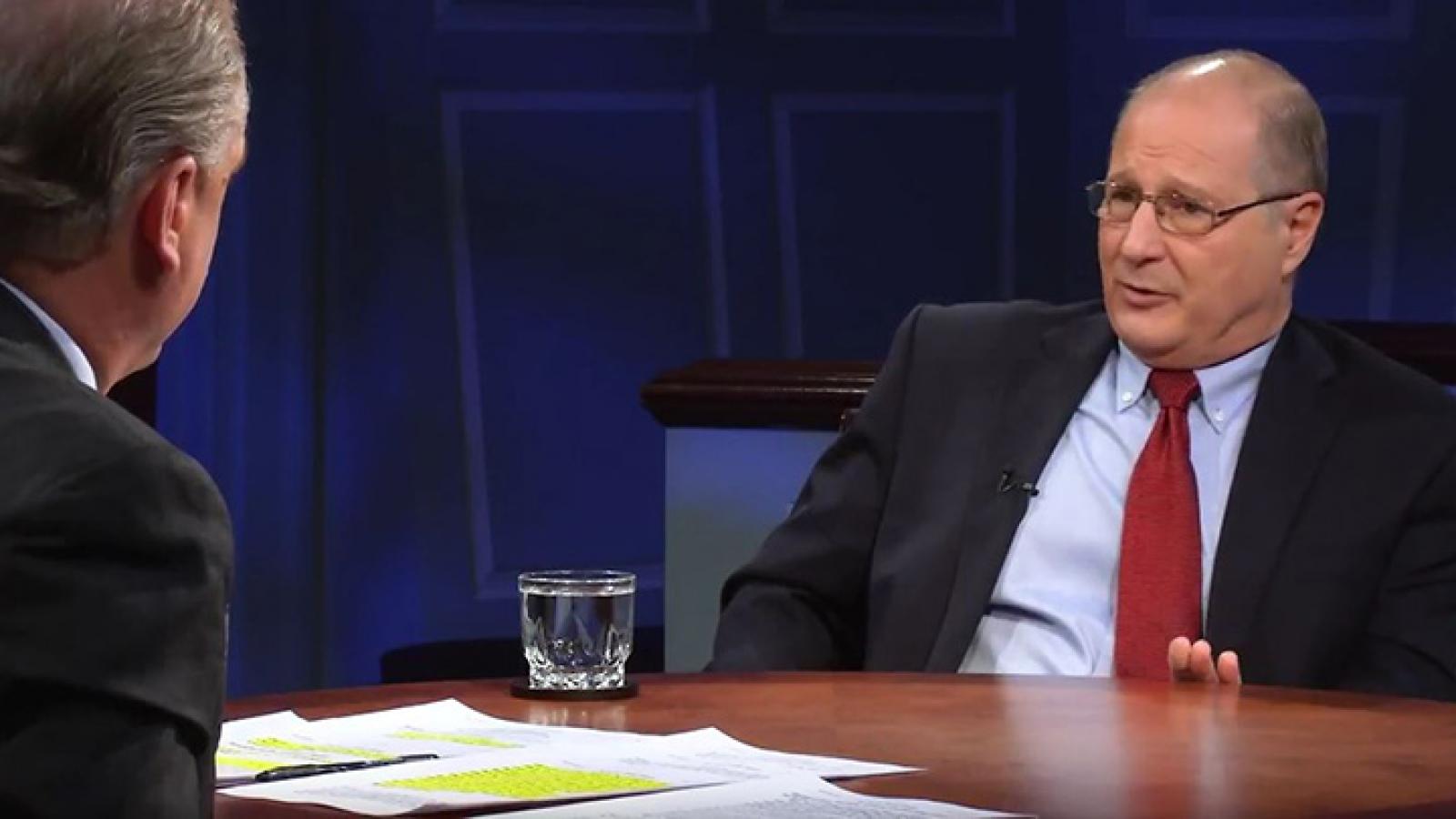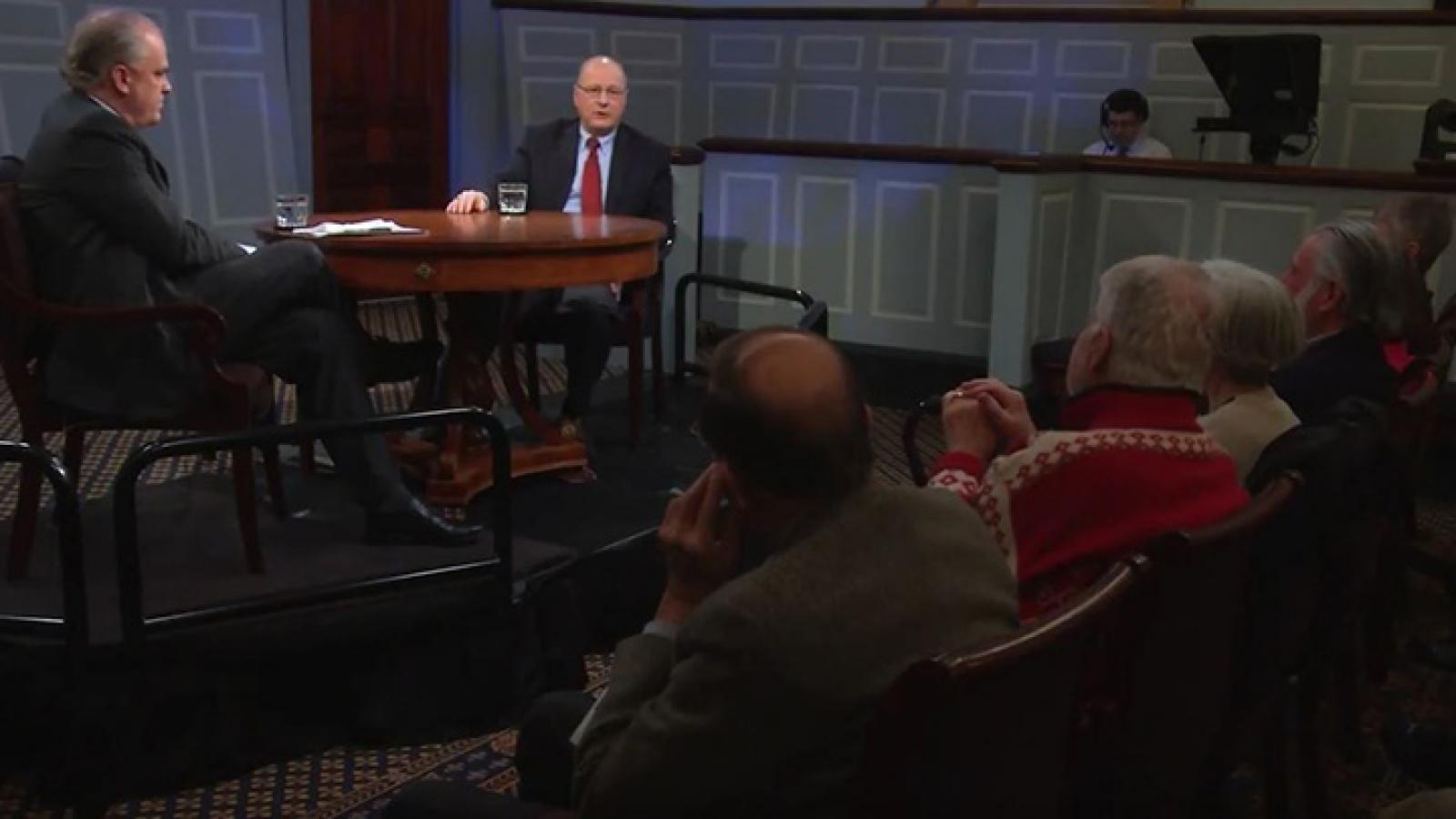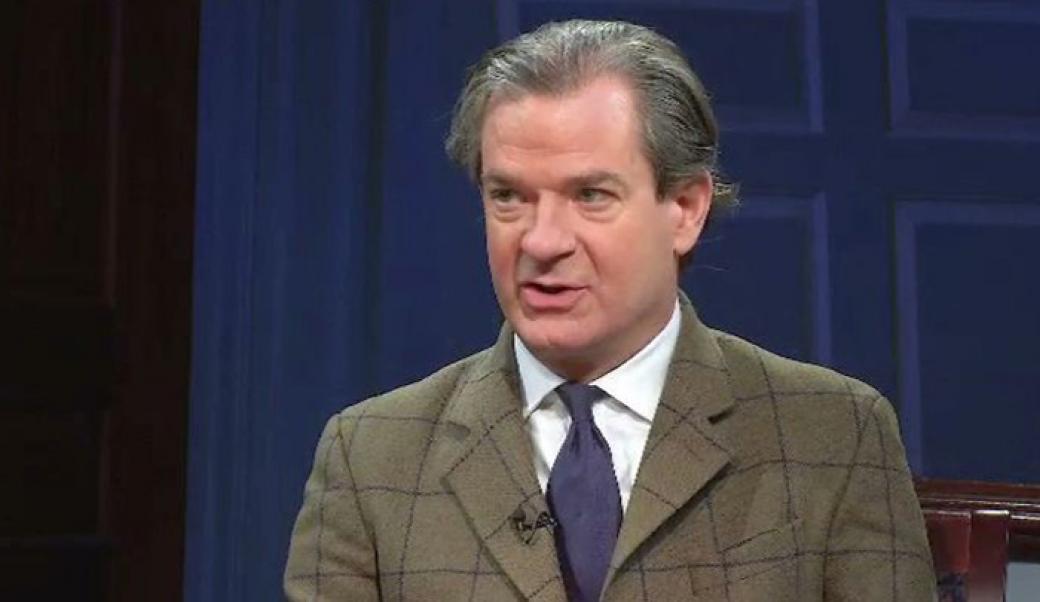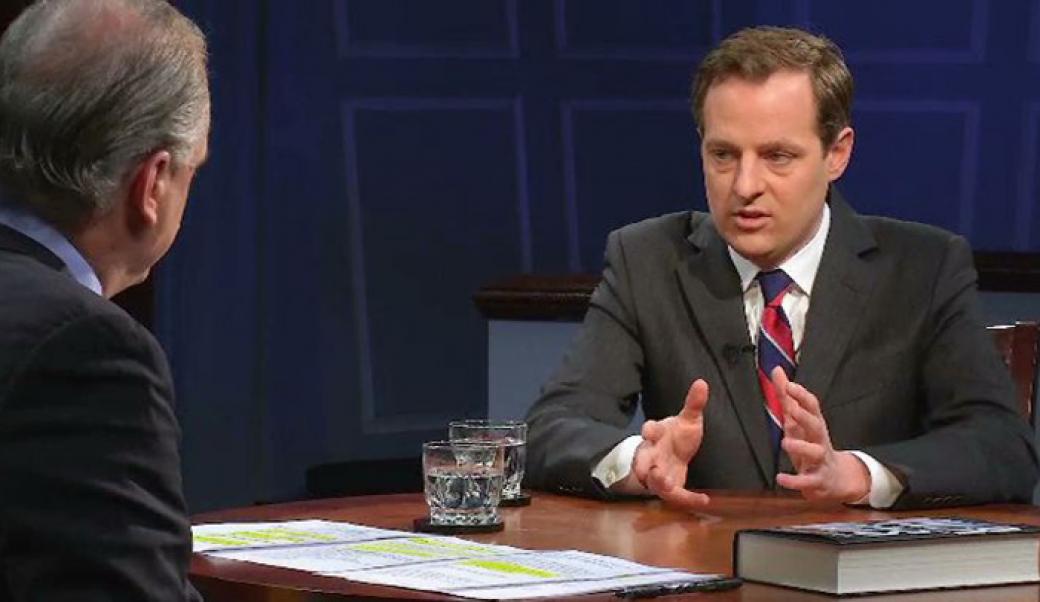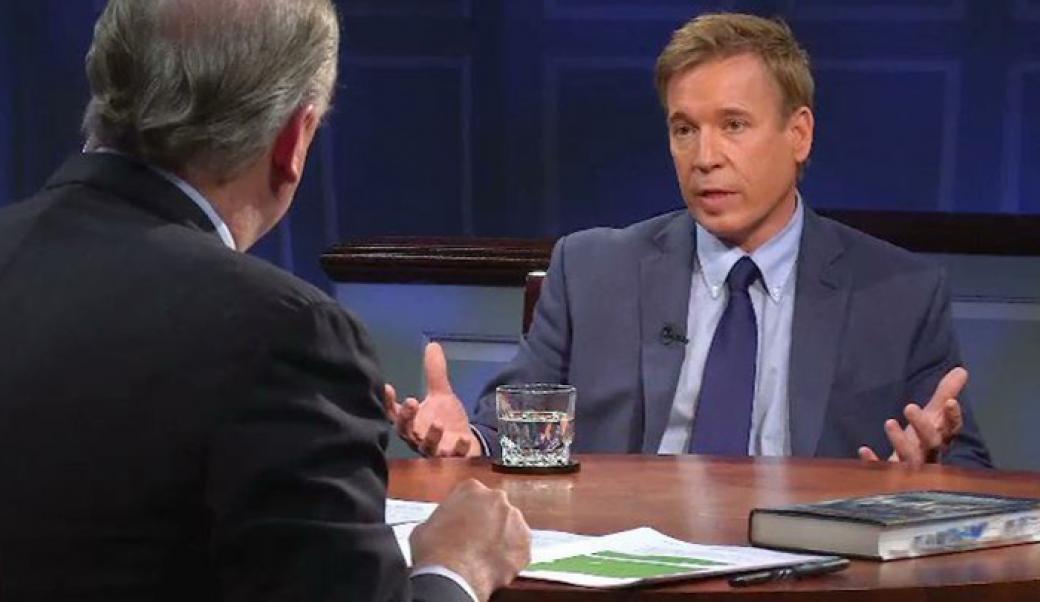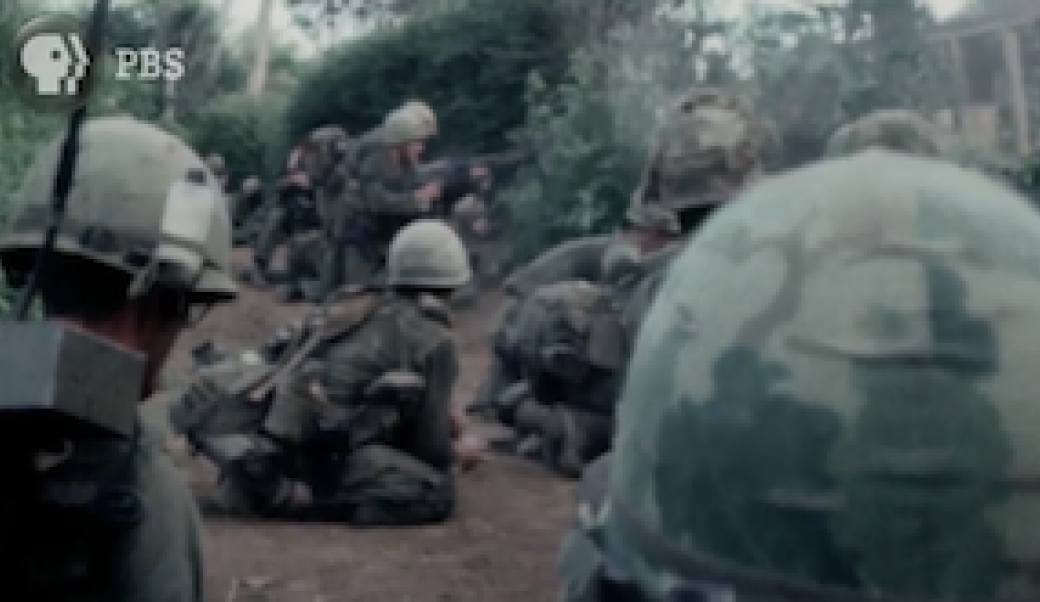About this episode
April 14, 2016
Eric Edelman
Miller Center Senior Fellow and veteran diplomat Eric S. Edelman, an advisor to both the Clinton and George W. Bush administrations and former top aide to Vice President Dick Cheney and GOP presidential nominee Mitt Romney, discusses U.S. foreign policy challenges in a world of constantly shifting terror threats and new geopolitical conflict.
Transcript
0:41 Douglas Blackmon: Welcome back to American Forum. I’m Doug Blackmon. When the United States invaded Iraq in March 2003, President George W. Bush and Vice President Dick Cheney asserted that there was no doubt that Iraqi President Saddam Hussein had weapons of mass destruction. But after 13 years of continuous war, and the deaths of nearly 5,000 U.S. military personnel in Iraq, no weapons of mass destruction were ever found. Many Americans came to believe that the invasion made the U.S. and the world less safe than ever President Barack Obama came into office on a wave of discontent over the handling of the Iraq war but ultimately adopted some of the same tough strategies of the Bush administration. His withdrawal of most U.S. troops from Iraq is viewed by many as having accelerated new threats to national security—such as the terror group known as ISIS, the civil war in Syria, the migration crisis it has triggered in Europe, and possibly the tragic new wave of terror attacks in France and Belgium. The experiences of both administrations underscore just how tangled and unpredictable foreign policy is for any American leader.
FACTOID: The Question: Has Obama foreign policy harmed U.S. interests?
Joining us today is Ambassador Eric Edelman, a major foreign policy advisor first to President Clinton and then, more prominently, in the Bush administration. He is a former Ambassador to Finland and Turkey, and was a top aide to Vice President Cheney at the time of Iraq invasion. He has been an outspoken critic of the Obama administration’s approach to foreign policy. He was a key adviser to Mitt Romney’s presidential campaign in 2012, and has briefed a number of GOP contenders in 2016. He is also a high-profile figure among a group of leading Republicans who are publicly committed to stopping Donald Trump from receiving the GOP nomination for president of the United States. Ambassador, thanks for joining us.
Eric Edelman: Doug, good to be with you.
2:30 Blackmon: So uh let’s talk first about your critique of the Obama administration. You’ve been a very outspoken critique of the foreign policy uh you’ve said that the president has quote an ideological aversion to American power, a strategy whose overriding mephitis is to constrain that power. What exactly do you mean by that?
Edelman: Well I think the president himself has uh said in his recent interview with Jeffrey Goldberg in the Atlantic pretty much the same thing I have said he he thinks American power more often than not has created more problems than it solves. Um and uh I think It’s good for any president to be prudent about the use of American power I think that’s what we all want in a president uh but I think uh power is ultimately the basis of any uh effective diplomacy. I thought that during my 30 year career as a diplomat, uh and I’m fond of quoting George Kennan, the great American foreign service officer who in 1946 uh gave a lecture to the National War College in Washington and said that uh you’d be amazed at how much it improves the uh politeness and constructiveness of diplomacy to have a little quiet power in the background and I think that’s a very important sinequanone of an effective diplomacy, its not the only thing that goes into effective diplomacy but it’s a fundamental element that one has to have in place.
FACTOID: George Kennan best known as advocate of Cold War containment
3:57 Blackmon: Your suggestion is not that is not a part of this somewhat extreme idea that the president is in fact unpatriotic or you don’t go that far.
Edelman No, I’m not suggesting that at all. I mean the president, I’m sure, he believes a patriot and I think he’s trying to do the right thing for the country. I just disagree with the fundamental approach he has. I think there are basically three elements I think in a critique in the Obama administration’s foreign policy. The first is that he’s allowed America’s defenses to atrophy because of a trillion dollars of defense cuts in the first several years of administration with now uh under the Budget Control Act and sequestration another trillion uh looking forward. And uh this is in the face of uh what uh many people see as the uh most volatile and complex international environments we’ve ever faced.
FACTOID: Budget Control Act of 2011 made almost $1 trillion in cuts
I was on the national defense panel, which was a bi-partisan group uh led by uh General John Abizaid and former secretary of defense Bill Perry. Uh Michèle Flournoy and I and she was my successor in the Pentagon. Uh we’ve worked together in a number of bi-partisan efforts. We testified together in front of the Congress and wrote a op-ed together in the Washington Post suggesting that the cuts had gone too far and that uh defense needed to be funded at a much higher level. That’s the first element. The second element is the President, in looking at international uh problems around the world, has tended to prioritize relations with our adversaries with Iran, with Russia, with China, at the expense of our allies, uh whom as revealed in the Jeffery Goldberg interview he holds in pretty much contempt and that is very different from the approach that most presidents have followed since the end of World War II where the priority has been on uh sustaining those alliances, maintaining America’s ability to uh have forward presence forward defense. Um and I would argue that actually in some ways uh we’re now seeing the logical consequence of these policies in the comments that Donald Trump has been making about getting out of our alliances and withdrawing from our forward positions around the world.
6:13 Blackmon: What’s the different path that a Democratic president might have taken in the wake of the public discontent with Iraq and such at the time, what would’ve been a better alternative approach for the President than the one that he did take?
Edelman: Most American presidents have at the outset of their tenures uh tried to umm assure our allies that um that they understand their problems that they understand their circumstances and that the United States will be there to support them uh in conflicts with uh punitive adversaries or opponents uh and I think the President failed to do that on the contrary I think over time he has strained our relations with all of our allies which I think are now in some disrepair. Um and I think uh that’s something that the next president whoever it is, is going to have to spend a fair amount of time dealing with.
7:06 Blackmon: Even though there was an agreement in place for withdrawal at the time that he becomes president uh I assume you would say that he actually should have retained a larger force in Iraq, should have stayed the course more so, even in the midst of a political environment that had seemed to suggest in the course of the campaign that the American people wanted troops out but . . .
FACTOID: U.S.troops began to withdraw from Iraq at the end of 2011
Edelman: Yeah well I agree with that. Uh I think uh when we negotiated the uh the status of forces agreement and a strategic framework agreement with Iraq in fall of 2008 in the midst of the presidential campaign. It is true as the Obama administration has asserted that there was a date certain on December 31st, 2011 for the withdrawal of U.S. forces. Nobody was involved in that at the time, whether it was General Patraeus or Ryan Crocker believed that that date would hold. In fact, everybody believed that there would have to be some extension of the U.S. presence after that date. So the idea that the administration was somehow bound by the date and they had to terminate the U.S. presence I think doesn’t really hold water
8:13 Blackmon: How might this administration have handled Vladimir Putin and the events in Ukraine and preceding that?
Edelman: There have been a whole series of missteps. Uh beginning with the um undertaking of the administration early on to cancel the um uh missile defense arrangements that had been negotiated between the United States and its allies in Europe notably Poland and the Czech Republic in the Spring uh in the Fall rather of 2009. Um I think that think that sent a signal to Russia Uh, we know about the President’s comments to then President Medvedev that you would have more flexibility after the 2012 election to deal with uh President Putin’s grievances. And all of that I think ultimately led to the circumstance we’ve found ourselves in 2014 with the invasion of Crimea and the destabilization of Eastern Ukraine. And in that instance, there was a pretty good reason to believe because the current secretary of defense has said it in testimony and there’s plenty of other evidence on the record and in the New York Times and Washington Post that senior members of his administration all support providing the government of Ukraine with lethal umm arms assistance to withstand this assault from Russia and the sole person who has blocked that is the President of the United States. I think the most dangerous thing that’s done is raise doubts in the minds of our NATO allies among the Baltic States and in central Europe, Poland and elsewhere that the United States would actually come to their aid and would make make good on its Article 5 undertaking and under the North Atlantic Treaty to defend them were they to find themselves under assault of this kind by Russia that has, I think, created a very serious problem inside the alliance.
FACTOID: NATO Article 5: An attack against one ally considered attack on all
10:04 Blackmon: Tell us more about your criticism of the Iran deal.
Edelman: Everyone I think agrees that if we could reach an agreement with Iran to limit their ability to develop a nuclear weapon it would be better for the, for the region, for the United States, and for the world. There’s no question about that.
FACTOID: President Obama signed Iran nuclear deal in October 2015
The question is on what terms. In the past, the United States had taken a position that Iran should not be entitled to any enrichment capability at all. In the end of the day, this administration agreed to a deal which allows Iran to maintain an industrial scale enrichment capability and to do it on a time limited basis, that, you know, the time table for the agreement, different parts of it expiring in 10, 15 years, the different constraints on Iran. And this was done on the grounds that we would get more transparency about Iran’s program, uhh, and that over time hopefully we’d, we’d be able to keep Iran from developing a weapon. In fact, what we’ve gotten is less transparency and that’s been attested to by the recent IAEA reports that have been done on Iran’s program.
FACTOID: Jan. 2016: Iran sanctions lifted as part of deal releasing about $100B
11:14 Blackmon: Is our foreign policy going to be primarily predicated on a punitive strategy that we, and I would argue that that probably has been the primary American, umm, impulse for some time now of that countries that break international norms are, that we consider to be adverse to our interests, we’re going to take a punitive approach to them until they change their behavior. Uhh, President Obama has certainly had a messy foreign policy agenda. But there has at least been some sense of that there has to be some alternative to a punitive strategy. But how do you balance those things between a purely punitive approach and okay let’s let somebody who’s been a malefactor have a chance again at being part of the international community?
Edelman: I’m all in favor of “carrot and sticks,” and enticements, you know, as well as punitive measures. I’m opposed to deals that give people great benefits up front without making them provide some kind of, you know, reciprocal concession on their behalf, umm, you know for their part. And I think that’s what we’ve seen. I think we’ve seen it with the opening to Cuba. I think we’ve seen it with Iran. I think we’ve seen it in the arms control deals that were essentially negotiated at the beginning of the administration with Russia.
12:30 Blackmon: You were ambassador to Turkey and Turkey has been more prominently in the minds of, of Americans of late because of both its important role in the migration crisis, the migrant crisis in Europe, uhh but also now we’ve had recent terror attacks there, fear of destabilization of, of Turkey more broadly. How do you feel about the, uhh, the administration’s approach to Turkey?
Edelman: So I think actually the administration has managed to misplay this, you know, consistently with Turkey. I mean in the first instance, I think it was inclined to take Turkish pretentions to being a Middle East Superpower too seriously and was willing at the beginning to outsource too much of its policy, particularly with regard to the conflict in Syria, uhh, to Turkey, only to discover that the Turks on their own actually lack the ability to play the kind of role we hope they would play. Umm, and uhh now I think it’s, it’s sort of flipped the other way. Again, if you look at the Geoffrey Goldberg interview with the President he says he had great hopes for Erdoğan, but now he’s just dismissed Erdoğan as an authoritarian and someone unwilling to do what we want them to do in Syria.
FACTOID: Turkish President Erdoğan was prime minister of Turkey, ’03-’14
Turkey does sit right on top of Syria. It’s got a major interest in what happens there and for five years we’ve had a kind of dialogue of the deaf with a, with the Turks about what needs to be done. And in part it’s because we are unwilling to do anything, this is the President’s constraining U.S. options, again something that most of his, as best we can tell from press reports, his cabinet officers and sub-cabinet officers have proposed, or supported the idea of some kind of safe zone or no fly zone in Syria to, uhh, create a space for refugees so they don’t have to leave the country, but also that would protect, create a buffer zone for Turkey. This is something the Turks have asked for consistently and something I think we should have engaged them on more seriously in the past.
FACTOID: The Question: What should next president do in Syria?
14:22 Blackmon: What should the next president do, once in office, with regards to Syria?
Edelman: Well the choices now are really quite poor. I mean uh, one of the things of not acting early. Colin Powell used to have a saying that bad news never gets better. By not acting early, you foreclose options at later points in time. And five years of inaction that we have seen in Syria, has I think really, it’s been inaction punctuated by occasional bursts of feckless activity.
FACTOID: Visit firstyear2017.org for more advice for the next U.S. president
14:56 Blackmon: So the U.S. should of been more aggressively engaged, and should have been providing more arms.
Edelman: The President I think has tried to always define this in sort of binary choices. Either the United States invades and overthrows Assad and then occupies the country with hundreds of thousands of troops. I'm not aware of anybody at any point since 2011 that's advocated that.
FACTOID: Bashar Al-Assad has been president of Syria since July 2000
And that the only other alternative is to you know, engage in the masterly inactivity that he has presided over. I do think that there are other options and I think those other options three, two, three years ago were advocated by David Petraeus, by Secretary Clinton, by Secretary Panetta and others. And I think had those recommendations been acted on earlier, I think you would've seen a potentially different type of outcome. Unless we provide the framework for action, others will not act. Or, if they do act, they are likely going to do it in ways that we are going to find maybe not that helpful and perhaps troublesome because they won't be as respectful of collateral damage and human rights and other kinds of concerns that we rightly have.
16:10 Blackmon: Do you think the attacks, the horrible terror attacks in Paris a few months ago and now the events that have happened more recently in Belgium. Are those extended derivatives somehow of the administration's failure to have dealt appropriately with ISIS and the other activity in Syria?
FACTOID: ISIS claimed responsibility for Paris and Brussels attacks
Edelman: You know it's not a direct result but it's certainly an indirect result. In the sense that one of the things we discovered for instance by allowing Afghanistan to fester after the Cold War ended and after the Soviets had been expelled created a kind of petri dish in which al-Qaeda could grow. And what's happened now in Syria, you know the creation of this ungoverned space, failed state, uh has been the growth of a whole series of movements. ISIL is only one of them, uh but the one that is most concerning obviously. That is now going to come back and create enormous problems in Europe because of the number of fighters who have gone to Syria and are moving back now. And uh, you know we've already seen that it has potentially reached into the U.S. as well from people who for some reason or another associate themselves with ISIL as we saw in San Bernardino.
FACTOID: 14 killed during ISIS-inspired mass shooting in San Bernardino, CA
17:31 Blackmon: If we go back to the decisions you were a part of in the early 2000s, particularly leading up to the invasion of Iraq. Do you have any regrets about any of that now?
Edelman: You know hindsight's 20-20 so it's very difficult to go back and put oneself in position before one knows what came afterwards. Um, I have no doubt that Iraq is better without Saddam Hussein. Uh uh, I have no doubt that he was working on WMD. I think the biggest problem in retrospect is not the initial decision to invade, it’s how we managed the aftermath where I wish we could've done some things differently earlier than we finally did in 2007 and 2008 with the surge.
FACTOID: 2004 official report said Saddam wanted WMDs but had none
18:16 Blackmon: But I wanna make sure I heard correctly a second ago. So you said that you’re still convinced that Hussein was working on weapons of mass destruction programs and you mean in a live way and I don't mean to be . . .
Edelman: The programs were ongoing, I mean, if you want to see in the New York Times, we've had hundreds of U.S. soldiers who have been exposed to chemical weapons munitions that were still part of those stocks. Now the question is, were they demilled properly, were they leftover, they weren't active production. Those questions we still don't know all the answers to but there's no question that he'd produced these weapons in the past, he'd used them on his neighbors and his own population. We had every reason to believe he was still planning to develop those programs and if Saddam Hussein had been overthrown with a lot of this weaponry all around, the circumstance later on could've been even worse.
19:12 Blackmon: But it is interesting that there’s an argument to be made that one of the most successful containment policies in foreign policy, over the famous strategies over foreign policy for the last 30, 40 years was the approach to Iraq in the first Bush presidency and that in effect that the wise decision not to topple Saddam Hussein had very recently been talked a good bit about again.
Edelman: I would take issue with several of, of those points, Doug. Um so first uh the acceptance of Saddam Hussein as President Bush 41 has said in his memoirs was actually based on the assumption that he was going to disappear because at the end of the war, 18 of the 19 of the provinces uh were uh in uh in rebellion and the assessment was that Saddam was not going to survive so it, it wasn’t predicated on the notion that we’re going to live with Saddam. Secondly, I think the uh, regime that had been put in place after the war, which was as you’ll recall a combination of sanctions uh and uh inspections of Iran’s programs was uh you know really falling apart. Um so I don’t think it was a sustainable position and even had we not gone in in 2003 I think some subsequent administration was going to have to you know cope and deal with this problem.
20:41 Blackmon: Let’s turn to uh present politics uh to some degree.You’re part of this group of Republicans prominent conventional Republicans, one might say, um uh who have vowed to uh stop Donald Trump from uh I guess you’ve said by whatever means necessary but as close to that (Edelman: There’s some means I would rule out) um but uh but how serious are you about that if Donald Trump ends up being the nominee would you . . .
Edelman: I will not support Donald Trump
Blackmon: Under any circumstances?
Edelman: Under any circumstances.
Blackmon: Do you think that’s the majority of the 50 folks that signed the letter that you signed?
Edelman: Uh I think we’re up to 120 signatures now I um can’t speak for anybody but myself um but um when I’m asked about this question, “Why did you sign the letter?” They’ll say, “Did you sign because he’s not a conservative?” And I say, “Well he’s clearly not a conservative. I mean he believes in single-payer healthcare, he’s opposed to any kind of entitlement reform he uh is you know uh against free trade and he’s against uh you know our traditional alliances, but that’s not the reason why I signed it.” And they say, “Well is it because he’s not a Republican?” And I say, “I mean if he’s a Republican he’s a Johnny-come -lately Republican because he’s identified as a Democrat for most of his adult life and most of his political donations have gone to democratic candidates, including notably Hillary Clinton um yeah, but that’s not the reason.” They say, “Well is it because you believe in an aggressive foreign policy and he believes in non-intervention?”
FACTOID: Trump donated to Hillary Clinton campaigns in ’02, ’05, ’06, and ’07
And I go, “It’s not even that. It’s because I believe he is temperamentally unsuited to be president and that he represents a threat to the constitutional order.” And I say that based on his uh comments about changing libel laws to be able to sue journalists who criticize him more easily. I say that because of the kinds of threats he’s made about people who fund Political Action Committees opposed to his campaign uh and because of the uh general intemperate rhetoric he’s used with regard to questions of religion, but also protesters you know who are engaging in protest at his rallies. And I think that uh not that the protesters are blameless by the way I mean but but the violent atmosphere he’s encouraged I think is dangerous to the fabric of our republic.
23:06 Blackmon: I take it that you share at least some of this view that uh the kinds of things that he has said that have been offensive to many minorities and others uh that were he to become the Republican nominee that that could have a sort of catastrophic effect as some analysts have said of separating the Republican Party from those minority groups the same way that African Americans have seemed to be so unreachable to uh the Republicans and the effect of that in an increasingly diverse society would be the GOP becoming a permanent minority party.
Edelman: Honestly I oscillate between concerns that uh his uh nomination will be you know uh would be to an electoral debacle for the Republicans uh but actually contemplating him actually being elected president I’m not sure which is worse actually.
23:55 Blackmon: If you were sitting down with the next president whoever that is including Donald Trump uh in uh in March of uh of uh 2017 uh and you had the opportunity to say look here are the on these key issues we’ve been talking about here are the two or three or four things that you most urgently must undertake what would those be?
Edelman: The first would be to find a budget agreement with the Congress um that enables the um the Budget Control Act to be relieved and the um uh the uh defense budget to be turned to an appropriate level I mean the last time we had a defense budget that was done on the basis of an actual analysis of the Defense Department’s needs was the budget that was proposed by Secretary Gates for fiscal year 12. And I would urge the new president to spend the first few months of their term working on repairing our alliance relationships uh and making sure that our allies understand that uh the United States is not retreating from the world, that we’re not willing to allow the international order that was created largely by the United States by 1945, to be to be dismantled. And that we’re going to continue to um try and make that system work with their with their help and assistance.
25:18 Blackmon: Ambassador Eric Edelman thanks for being with us.
Edelman: Thank you Doug, great to be here.
Blackmon:We hope you’ll join this conversation with American Forum on the Miller Center Facebook Page or by following us on Twitter @DouglasBlackmon or @AmericanForumTV. To send us a comment, watch other episodes, download podcasts or read a transcript visit us at MillerCenter.org/americanforum. I’m Doug Blackmon. See you next week.
